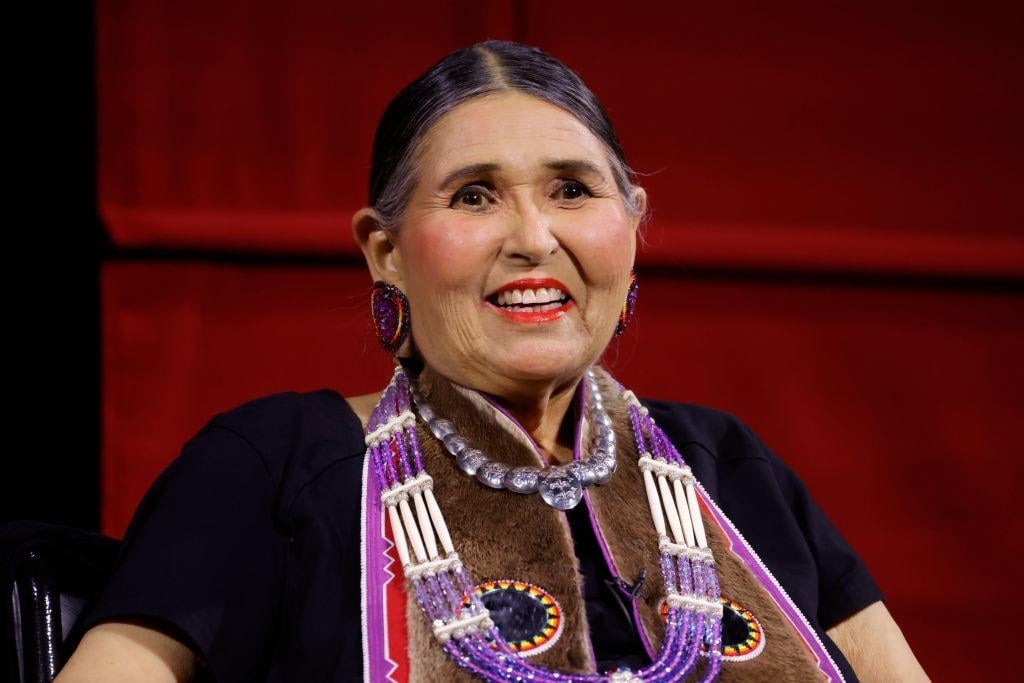Sacheen Littlefeather was never a Hollywood star, but she made cinema history at the Oscars back in 1973. She was there not to collect an Academy Award, but to turn one down. She was delegated by Marlon Brando to decline the Best Actor Oscar he won for The Godfather, as a protest against Hollywood’s treatment of Native Americans on screen.
Up she went, wearing a buckskin dress and with her long, dark hair in ponytails. “Hello, my name is Sacheen Littlefeather,” she said. “I’m Apache and I am president of the National Native American Affirmative Image Committee.
I’m representing Marlon Brando this evening, and he has asked me to tell you. . .
that he very regretfully cannot accept this very generous award. Advertisement “And the reasons for this being are the treatment of American Indians today by the film industry and on television in movie re-runs, and also with recent happenings at Wounded Knee [scene of a historic massacre and an ongoing siege involving Native American activists and federal agents]. “I beg at this time that I have not intruded upon this evening, and that we will in the future, our hearts and our understandings will meet with love and generosity.
Thank you on behalf of Marlon Brando. ” She presented a dignified figure throughout. But then all hell broke loose.
There were boos and jeers mixed with a few cheers. According to several accounts John Wayne, living up to his screen image at the sight of an Indian, went on the warpath and had to be held back by no fewer than six security guards. Littlefeather said that she was at Brando’s house later when a motorist fired off shots in their direction.
The press got stuck in, claiming Littlefeather was not even Native American. Hollywood closed ranks and job offers proved few and far between. The Academy of Motion Picture Arts and Sciences changed their rules to make sure there could be no repeat performance.
Advertisement Earlier this year, however, the Academy issued a formal apology. Academy president David Rubin said: “The abuse you endured because of this statement was unwarranted and unjustified. The emotional burden you have lived through and the cost to your own career in our industry are irreparable.
For too long the courage you showed has been unacknowledged. For this, we offer both our deepest apologies and our sincere admiration. ” “We Indians are very patient people,” Littlefeather said.
“It’s only been 50 years. We need to keep our sense of humour about this at all times. It’s our method of survival.
” And just last month the Academy hosted “an evening of conversation, healing and celebration” with Littlefeather. She was born Marie Louise Cruz in Salinas, California, in 1946. Her father was of Apache and Yaqui Indian descent.
Her mother had Dutch, French and German ancestry. They had their own business, making leather saddles. Littlefeather spoke in interviews of a difficult childhood, claiming her father was abusive.
She lived much of the time with grandparents. Advertisement In her early twenties she worked as a model and studied drama at California State College. Increasingly interested in her Native American heritage, she adopted the name Sacheen Littelfeather and participated in the occupation of the former prison island of Alcatraz.
She managed to combine political activism and modelling work and won the title of Miss Vampire USA, a novelty contest promoting the horror film House of Dark Shadows. Shortly before her controversial Oscar appearance she renounced her US citizenship. Brando had a strong interest in Native American affairs and culture and had known Littlefeather for a year or so before the Oscars.
Like many liberals, he was deeply concerned by the violent stand-off at the town of Wounded Knee on Pine Ridge Indian reservation in South Dakota. He recruited Littlefeather to help him make a high-profile protest and seemingly contacted her just the night before the ceremony. His attempts, however, to link it to Hollywood’s portrayal of Native Americans seemed oddly timed at a point where the industry was well into the process of redefining them as the good guys and victims, through such recent movies as Soldier Blue, Little Big Man and A Man Called Horse.
Advertisement Littlefeather was more of an aspiring actress than a star at the time of the Oscars. She had appeared in a few commercials. Her earliest credit on the Internet Movie Database was a supporting role in an obscure 1973 movie called Counselor at Crime, a European production starring Martin Balsam.
It shot in Italy and the US, including San Francisco, where Littlefeather lived. She appeared in only a handful of films, including Freebie and the Bean, in which she did not even have an on-screen credit, and The Trial of Billy Jack. It was a sequel to Billy Jack, which featured a contemporary Native American protagonist and acquired a cult following.
By the end of the 1970s her film career was effectively over and she devoted her energies to various Native American organisations and campaigns. She taught others about Native American culture. And she worked at an AIDS hospice in San Francisco that Mother Teresa founded and met her.
Littlefeather struggled at times to reconcile her Native American and European heritages, but had reconnected with the Roman Catholic faith of her childhood. Advertisement She died of cancer at her home in Novato in the San Francisco Bay Area in California. She was married twice.
Her second husband died last year. They had been together for over 30 years. Surviving family include two younger sisters.
Obituaries If you would like to submit an obituary (800-1000 words preferred, with jpeg image), or have a suggestion for a subject, contact [email protected] Subscribe Advertisement Subscribe at www. scotsman. com/subscriptions.
From: scotsman
URL: https://www.scotsman.com/news/people/obituaries-sacheen-littlefeather-native-american-activist-in-1973-oscars-storm-3871082
